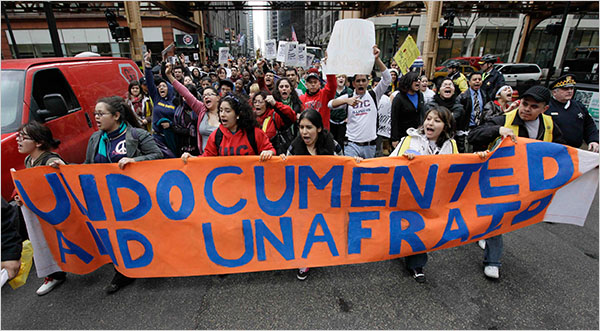|
SOC 335 Hybrid Course for College of the Canyons Winter 2012  
  |
||||
|
SOC 335 Hybrid Course for College of the Canyons Winter 2012  
  |
||||
This course explores the rich and diverse
sociological
experiences
of the Latino peoples in the United States around four distinct and
historically specific topics covered in four books. The
first one analyzes the experiences of migration, settlement, and
repatriation of the
first large waves of Mexican workers in California's agricultural
regions at the end of the 19th century and the early
decades of the 20th century - up to the Second World War (the
Guerin-Gonzales book). The
second one sharply focuses on one aspect of
the Chicano Movement of the late 1960s and early 1970s, namely
the rise of the Chicano Student Movement in California (the Mario
Garcia book). The third one
takes a look at one aspect of U.S. Latino communities today -- 55
million strong, almost
half of which are foreign-born -- specifically, the manner in which
Latinos immigrants "broker" their ethnic & immigrant identities in
the face of very hostile & economically challenging conditions in
the U.S. (the Massey
& Sanchez book). The fourth topic chronicles the
origins and mighty mobilization of the Latino immigrants' rights
movement in 2006, finally asserting, for the first time in U.S.
history, their full political presence and their
immediate demands for a just & comprehensive immigration reform
(the Voss
& Bloemraad book). Students will have an opportunity to deepen
these or other topics through writing chapter reading assessments of
all reading assignments, holding bi-weekly class discussions, and
writing two research papers.
This course fulfills the mission, goals
and objectives of the GRE General Education Requirement for a Bachelors
Degree at CSUB:
|
Gender Race & Ethnicity
Mission, Goals, & Objectives
Mission of the GRE Requirement: Students will develop an awareness, appreciation, and recognition of the social constructions of gender, race, and ethnicity in order to understand the diversity of human experience and values, particularly those contributions to knowledge and civilization made by members of historically under-represented groups. Fundamental to this requirement is the concept of cultural pluralism, which encompasses ethnic, cross-cultural, and intercultural studies as well as studies of the relationship(s) between dominant and non-dominant social groups. Goal 1. The course should have, as its principal focus, some aspect of the lives, roles, contributions, perspectives, and experiences of the particular group(s) discussed whether they be women or more specific ethnic and racial groups. Discussion of these groups needs to be set within a broadly defined context, one that might not be limited by national boundaries. Objective a. Students taking the
course should be able to demonstrate an understanding of the broad
processes of multicultural/global issues related to issues of gender,
race, and/or ethnicity.
Objective b. Students taking the course should be able to compare and contrast issues of gender, race, and/or ethnicity across different cultures. Goal 2. Relevant scholarship on the course topic, in historical context, should be an important part of course readings and discussions. Attention to past and present theoretical approaches should be incorporated into the course readings and discussions. Objective a. Students taking the
course should be able to compare past and present discipline-specific
theories related to gender, race and/or ethnicity.
Goal 3. The course should incorporate viewpoints of individuals whose lives may differ in terms of gender, race, and ethnicity. Objective a. Students taking the
course should be able to compare and contrast viewpoints of individuals
whose lives differ in terms of gender, race, and/or ethnicity.
Goal 4. The course should identify the structure and dynamics of domination and subordination. The course should include critical analyses of how cultural and societal assumptions about gender, race, and ethnicity function in individuals' lives. Objective a. Students taking the
course should be able to identify the structure and dynamics of
domination and subordination in gender, race and/or
ethnicity.
Objective b. Students taking the course should be able to analyze the ways in which cultural and societal assumptions about gender, race and/or ethnicity function in individual’s lives. Goal 5. The course should include the use of pedagogical techniques that encourage student participation, to enable them to be active learners and critical thinkers, and to examine their personal values. Objective a. Students taking the
course should be able to demonstrate critical thinking skills about
issues of gender, race and/or
ethnicity.
Objective b. Students taking the course should be able to identify how their personal values relate to and have changed regarding issues of gender, race and/or ethnicity. |
COURSE STRUCTURE
Class Sessions
and Blackboard Activities: The course will be run as a hybrid
course, meaning mostly reading and writing online but also attending
bi-weekly class sessions at College of the Canyon, on every other
Thursday (1/12, 1/26, 2/9, 2/23, 3/8) from 5:00 to 9:00 pm in room UCEN
211. Attendance on these dates and times are
required (absences, tardiness, leaving early will be penalized). Besides the five 4-hour class sessions,
students should plan to spend a couple of hours a day on the other days
reading, writing, and researching for this course.
Students will use CSUB's Blackboard for
all their online activities. To gain access to the CSUB BlackBoard
site click and bookmark the following URL address: https://bb.csub.edu/
Since you'll be accessing Blackboard from an off campus computer, make
sure your browser is properly configured (click on Blackboard support
links and read how you can ensure your browser is properly configured).
You will need to know your UserID
and password. Login to
Blackboard using your "myCSUB" Net ID and Password. If you don't know
your UserID or password, contact the Student Help Desk at (661)
654-2307 or call Extended University at (661) 654-2441 during office
hours.
Reading Assessments: To ensure that everybody reads, learns,
and comes to
class prepared to discuss the textbooks, students will be asked to
submit a "Chapter Reading Assessment" for every chapter assigned
(including the "Introduction" on the very first assignment). The
textbook assignments are made on a weekly basis, and so are the chapter
reading assessment deadlines: all chapter reading assessments for a
given week are due on that week's Sunday, at midnight, on Blackboard. PLEASE DO NOT SEND YOUR READING
ASSESSMENTS BY EMAIL, as they
will not be accepted, nor attach them as Word files in Blackboard,
either. Rather, compose your assessments in your own computer, using
software like Word, save them, then copy/paste
each of them into the appropriate field in Blackboard. There are 40
numbered chapter reading assessment columns under the link "Chapter
Reading Assessments" in Blackboard -- just start with number "one" for
your first assignment and keep going -- one assessment per column. The
following week, continue where you left off. For example, for the first
week you'll fill the chapter reading assessments # 1 (Introduction) to
# 4 (chapter 3), the second week you'll fill the assessments # 5
(chapter 4) to # 7 (chapter 6), and so on. REMEMBER TO SUBMIT YOUR
ASSESSMENTS IN THE RIGHT ORDER - IF
YOU FAIL TO SUBMIT AN ASSESSMENT, SKIP THAT COLUMN AND SUBMIT THE NEXT
ASSESSMENT IN THE NEXT
COLUMN AFTER THE SKIPPED ONE.
CONTENT: The minimum length of a Chapter Reading Assessment is the equivalent of
2 pages in Word, double spaced, font 12, 1-inch margins -- but please
do not go over 3 pages. These assessments must not
summarize or merely describe the readings, but must critically respond to them: express what the you think about them; identify the
areas of strong agreement and
disagreement with the author, explaining why you do, as well as
the areas or topics you find most
interesting to discuss, or anything in particular that impressed you greatly, caused you confusion or surprise. Whatever you choose to
write, you
should explain your specific
academic and/or personal reasons for doing
so. The reading assessment cannot and should not cover every issue found in the assigned
readings for the day; you must be selective
and demonstrate judgment
in the choices of topics you make to analyze (by the way, early topics
are always
suspect!). A very bad
assessment will reveal the student read very
little or very superficially, just to "do" the assignment (it's called
"just going through the motion"). A good
assessment will demonstrate the
student really read the material and did a serious effort to select and
critically grapple with some of the main issues raised. At the end of
each reading assessment, students should always write at least one
pertinent
question for possible class discussion.
Research Papers: Students
will be asked twice during the quarter to design, organize, and
write a
written research paper on a
pertinent sociological topic related to the varied Latino
experiences in the United States. Topics can range widely in
historic period,
ethnic group (or Latino-wide), economic, social, political, or
sociocultural aspects, immigration, social movements, wars of
incorporation, women, work,
family, education, religion, government, language, media, sports,
health, youth, aging, etc.. The students
must obtain approval
from
Dr. Santos
or Mr. Williams for their overall topic prior to the papers' deadlines,
at one of the five class sessions or by email/phone. Students are
encouraged to consult Mr. Joey Williams on all aspects of
their research papers. The course site in Blackboard may post a sample
research paper to serve as a guide, as well.
Plagiarism: To prevent students from wittingly or
unwittingly engaging in plagiarism, Dr. Santos strongly recommends
students create a TurnItIn account to check for possible plagiarism
prior to submitting their research papers, and to carefully read and
abide by the document CSUB
Classifications of Plagiarism found at: http://www.csub.edu/tlc/options/resources/turn_it_in_help_page.shtml
Anyone found guilty of engaging in
plagiarism will
automatically fail the course and be reported to the Office of Student
Discipline and Judicial Affairs for further disciplinary action.
Grading: Each research paper is worth 20 points, so together they are worth 40% of the grade. The reading assessments are worth, all together, 60 points. Also: Perfect attendance - no unexcused absences, tardiness, or early departures - will be rewarded with 5 extra points; un-excused absences and tardiness/leaving early will be penalized with two and one point off per instance, respectively. The final letter grade will be assigned, on a scale of 0 to 100, as follows:
| 94-100 = A | 87-89 = B+ | 77-79 = C+ | 65-69 = D |
| 90-93 = A- | 84-86 = B | 74-76 = C | < 65 = F |
| 80-83 = B- | 70-73 = C- |
E-Mail
& Phone Communications with Dr. Santos & Mr. Williams:
Apart from the five class sessions, students are encouraged to communicate with Dr. Santos & Mr. Williams via email and telephone -- see the top for their respective info. Whenever you email, always identify your full name in the message, please always start the subject heading of your messages with "Soc 335: YOUR NAME" and please be brief and to the point - expect very brief replies. You may request a phone appointment. If you leave a phone message, again please leave your full name, time and day you called, and CLEARLY and SLOWLY leave a number we can call you back (often students leave unintelligible numbers, too fast to recognize).
Schedule of
Weekly Reading Assignments & Bi-Weekly Class Sessions (Thursdays, 5:00 - 9:00pm)
| Week |
Reading
Assignments Due by Sunday Midnight, typed or pasted on Blackboard |
Thursdays'
Class Sessions at College of the Canyons (5:00-9:00pm) |
| 1 Jan 9-15 |
Mexican
Workers And American
Dreams Introduction, Chapters 1, 2, 3 |
1/12/12 Class Session # 1 |
| 2 Jan 15-22 |
Mexican
Workers And American
Dreams Chapters 4, 5, 6 |
|
| 3 Jan 23-29 |
Blowout! Sal Castro and the Chicano
Struggle for Educational Justice Chapters 1, 2, 3 |
1/26/12 Class Session # 2 |
| 4 Jan 30-Feb 5 |
Blowout! Sal Castro and the Chicano
Struggle for Educational Justice Chapters 4, 5, 6, 7 |
|
| 5 Feb 6-12 |
Blowout! Sal Castro and the Chicano
Struggle for Educational Justice Chapters 8, 9, 10, 11 |
2/9/12 Class Session # 3 |
| 6 Feb 13-19 |
Brokered
Boundaries: Creating Immigrant Identity in Anti-Immigrant Times Chapters 1, 2, 3 |
1st Research Paper Due on Sunday, Feb. 19 by midnight |
| 7 Feb 20-26 |
Brokered
Boundaries: Creating Immigrant Identity in Anti-Immigrant Times Chapters 4, 5, 6 |
2/23/12 Class Session # 4 |
| 8 Feb 27-Mar 4 |
Brokered
Boundaries: Creating Immigrant Identity in Anti-Immigrant Times Chapters 7, 8, 9 |
|
| 9 Mar 5-11 |
Rallying for
Immigrant Rights: The Fight for Inclusion
in 21st Century America Chapters 1, 2, 3, 4, 5, 6 |
3/8/12 Class Session # 5 |
| 10 Mar 12-18 |
Rallying for
Immigrant Rights: The Fight for Inclusion
in 21st Century America Chapters 7, 8, 9, 10, 11, 12, 13 |
2nd Research Paper Due on Wednesday, March 21 by midnight |